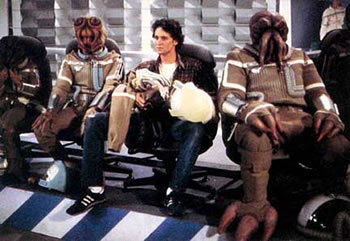Science Fiction
Dictionary
A B C D E F G H I J K L M N O P Q R S T U V W X Y Z
2011 Federal Virtual Worlds Challenge Announced

The Federal Virtual Worlds Challenge is an open. global challenge to the world to create the best implementations within virtual environments. This year the focus is on artificial intelligence.
(Virtual Worlds Challenge)
Historically the U.S. military and sister agencies have expended considerable resources in the development of high-fidelity immersive simulations. With budgets getting tighter it makes sense to leverage low-cost virtual environments to continue to support evolving simulation needs.The Federal Virtual Worlds Challenge provides an outlet for the U.S. Federal Government to access a global community of content developers. Anticipated benefits to U.S. Government agencies include:
- An opportunity to explore possibilities for using virtual worlds that have not, and may not have ever been considered by the Government.
- Access to emerging technology that would assist in developing requirements.
- The ability to explore the global collaboration concept as a research and procurement strategy for future training and analysis needs.
- Building public awareness regarding Government organizations and the work being conducted in virtual environments.
Winners receive a cash prize, travel accommodations to the GameTech Conference in Orlando, FL, and the opportunity to have their entries showcased at the conference.
In the 1984 film The Last Starfighter. a software simulation is used to train actual fighters.

(Alex and the other recruits)
Scroll down for more stories in the same category. (Story submitted 9/15/2010)
Follow this kind of news @Technovelgy.| Email | RSS | Blog It | Stumble | del.icio.us | Digg | Reddit |
Would
you like to contribute a story tip?
It's easy:
Get the URL of the story, and the related sf author, and add
it here.
Comment/Join discussion ( 0 )
Related News Stories - (" Artificial Intelligence ")
Grok Scores Best In Psychological Tests
'Try to find out how he ticks...' - Isaac Asimov, 1941.
Google's Nano Banana Pro Presents Handwritten Math Solutions
'...copy was turned out in a charming and entirely feminine handwriting.' - Isaac Asimov (1949)
Woman Marries Computer, Vonnegut's Dream Comes True
'Men are made of protoplasm... Lasts forever.' - Kurt Vonnegut
ChatGPT Now Participates in Group Chats
'...the city was their laboratory in human psychology.'
Technovelgy (that's tech-novel-gee!) is devoted to the creative science inventions and ideas of sf authors. Look for the Invention Category that interests you, the Glossary, the Invention Timeline, or see what's New.
Science Fiction
Timeline
1600-1899
1900-1939
1940's 1950's
1960's 1970's
1980's 1990's
2000's 2010's
Current News
The New Habitable Zones Include Asimov's Ribbon Worlds
'...there's a narrow belt where the climate is moderate.'
Can One Robot Do Many Tasks?
'... with the Master-operator all you have to do is push one! A remarkable achievement!'
Atlas Robot Makes Uncomfortable Movements
'Not like me. A T-1000, advanced prototype. A mimetic poly-alloy. Liquid metal.'
Boring Company Drills Asimov's Single Vehicle Tunnels
'It was riddled with holes that were the mouths of tunnels.'
Humanoid Robots Tickle The Ivories
'The massive feet working the pedals, arms and hands flashing and glinting...'
A Remarkable Coincidence
'There is a philosophical problem of some difficulty here...'
Cortex 1 - Today A Warehouse, Tomorrow A Calculator Planet
'There were cubic miles of it, and it glistened like a silvery Christmas tree...'
Perching Ambush Drones
'On the chest of drawers something was perched.'
Leader-Follower Autonomous Vehicle Technology
'Jason had been guiding the caravan of cars as usual...'
Golf Ball Test Robot Wears Them Out
"The robot solemnly hit a ball against the wall, picked it up and teed it, hit it again, over and again...'
Boring Company Vegas Loop Like Asimov Said
'There was a wall ahead... It was riddled with holes that were the mouths of tunnels.'
Rigid Metallic Clothing From Science Fiction To You
'...support the interior human structure against Jupiterís pull.'
Is The Seattle Ultrasonics C-200 A Heinlein Vibroblade?
'It ain't a vibroblade. It's steel. Messy.'
Roborock Saros Z70 Is A Robot Vacuum With An Arm
'Anything larger than a BB shot it picked up and placed in a tray...'
A Beautiful Visualization Of Compact Food
'The German chemists have discovered how to supply the needed elements in compact, undiluted form...'
Bone-Building Drug Evenity Approved
'Compounds devised by the biochemists for the rapid building of bone...'
